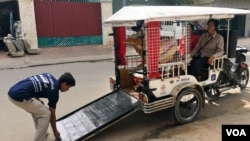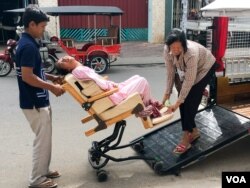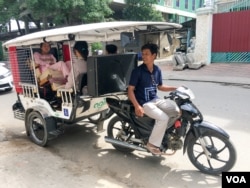For Reaksmey Mary and her family, a recent trip for a health checkup at a Phnom Penh hospital included a detour through downtown and visits to shopping malls.
The trip was a milestone for the group, who could no longer transport Reaksmey by motorbike. For years, she remained homebound on the Mekong River island of Koh Oknha Te, 15 kilometers from Phnom Penh.
Today, Reaksmey and her family use Mobilituk, a service for the physically disabled. Mobilituk has five tuk-tuks — small three-wheel motorized vehicles — that have been modified by Agile Design Group, a Phnom Penh-based organization that specializes in design projects that promote the inclusion of disabled people into everyday life.
Reaksmey was disabled with a serious illness when she was six months old. Her mother, Khem Vy, 47, told VOA Khmer that since her daughter was about 10 years old, "we could no longer take Mary anywhere by motorbike." The family tried using a regular tuk-tuk, but that proved difficult as well. The driver would struggle to get Reaksmey and her wheelchair into the cab.
"The wheelchair is very heavy. I am alone and I can't do it unless we have two people to hold her tightly," Khem said. "We stopped taking her out, so she stayed at home on the bed all the time."
Today, the Mobilituk — with a steel ramp that pulls down to allow a wheelchair to roll up — gives Reaksmey and her peers freedom. Or, as blogger John Morris wrote in an enthusiastic review of a Mobilituk: "affordable, wheelchair transportation means that disability in a developing country no longer has to be a sentence of house arrest."
According to Cambodia's Ministry of Social Affairs, by 2015 there were more than 50,000 physically disabled people in Cambodia. The Asian Development Bank estimates that as much as 15 percent of the population, placed at 15.9 million in 2016 by the CIA World Factbook, live with physical or mental disabilities.
Even in developed nations, disabled people encounter transportation hurdles, but in developing nations like Cambodia, the barriers are often higher.
Widespread benefits
Agile Design Group, working with the International Committee of the Red Cross, plans to expand the fleet of Mobilituks in the northern provinces of Cambodia. Keogh Johnston, an ADG engineer, told VOA Khmer that while the Mobilituk program benefits people with disabilities, it has been a rewarding project in other ways, too.
"When you see somebody, who never had the opportunity to see the city or go to a shopping mall or see more monuments," he said, "the joy that brings to them to see, you are just inspired to contribute more."
Mobilituks also expand opportunities for tuk-tuk drivers. A month after getting his tuk-tuk converted to a Mobilituk, driver Keo Sarout had two disabled clients, including Reaksmey.
"My clients said it's more convenient than a car or other vehicle," he said.
And Keo is pleased he can help. "I think I could help the society by helping the disabled persons as they find it quite difficult to travel anywhere," he said.
He added that other tuk-tuk drivers, having seen his Mobilituk, were interested in having the steel ramp installed on their vehicles.
With access to a Mobilituk, Reaksmey has traveled to the Royal Palace, Independence Monument, shopping malls, and the hospital. With her mother and an aunt along for the ride, these excursions are no longer ordeals.
Reaksmey looks healthier and happier now, said Khem.
"Although her body got hurt the first time she went on Mobilituk, because it was almost 20 years that she has not moved her body properly, she feels very happy,” Khem said.
"I asked her if she still wants to go out after hurting herself; she nodded her head with a happy smile."
This story was produced by the VOA Khmer Service.









